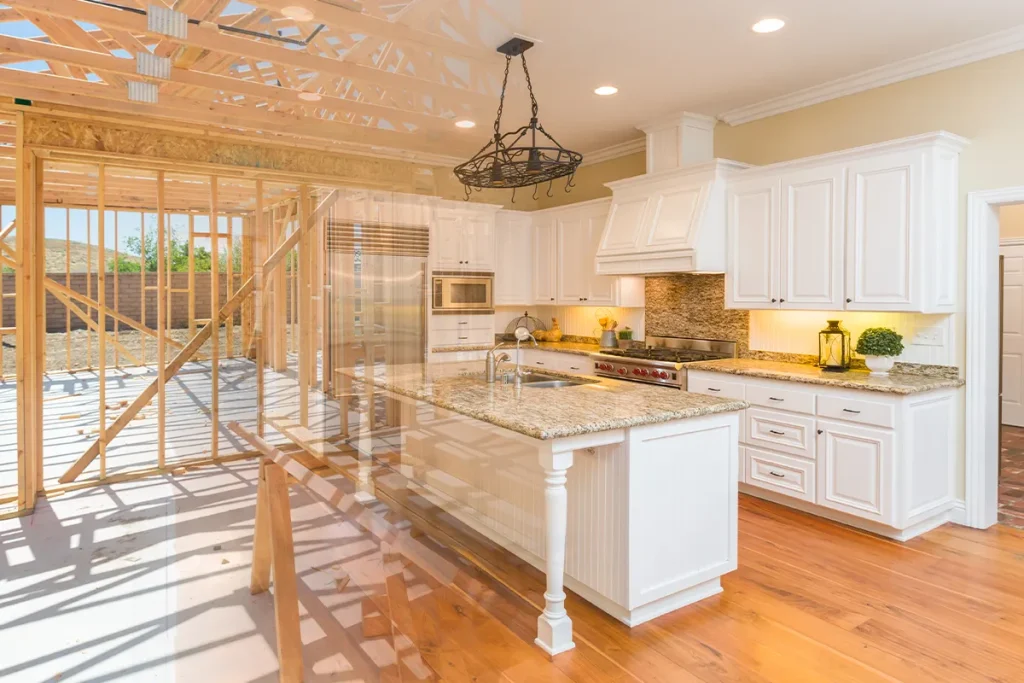

Common Mistakes to Avoid During Your Home Renovation
Dreaming of a stunning kitchen or a sun-drenched bathroom? A home renovation project can transform your living space, but it’s crucial to be prepared for potential pitfalls. Renovations often involve significant investment and time, and can quickly turn into a frustrating experience if not managed correctly. This guide dives deep into the common mistakes homeowners often make, helping you navigate the process smoothly, saving time, money, and preventing costly errors. We’ll cover key areas from careful planning and budgeting, to finding the right contractor, and understanding the potential for unforeseen complications, to ultimately avoid making these costly errors.
Budgeting Errors and Lack of Planning
Unrealistic Budgets
Homeowners often underestimate the total costs associated with home renovations. Unrealistic budgeting is often one of the top mistakes. The cost of materials, labor, permits, and unexpected issues can easily escalate beyond initial estimates. A thorough, well-researched budget will enable you to avoid financial difficulties during your renovation project. Failing to consider these factors can lead to significant stress and financial strain. A detailed breakdown of projected costs, including material costs, labor, permits, and potential contingencies, should be part of your initial planning phase.
Poorly Defined Scope
A vague scope of work often leads to misunderstandings and costly changes during the project. Clearly defining your goals and the extent of the renovation from the outset is essential. A detailed project scope, outlining specific tasks, materials, and timelines, sets realistic expectations for all stakeholders and allows for a detailed cost estimation. This clarity helps avoid costly disputes and delays. For example, a homeowner who initially envisioned a minor kitchen remodel might discover that replacing outdated plumbing or electrical systems was necessary, adding significantly to the project’s budget and timeline.
Ignoring Contingency Plans
Unexpected issues and delays are common during renovations. Building in a contingency budget for unforeseen circumstances is crucial. A small contingency fund will provide a buffer against potential problems such as material shortages, permit delays, or unexpected design changes, minimizing potential financial and project timeline issues.
Poor Communication and Contract Issues
Establishing a clear and open line of communication with your contractor is essential to a successful project. It’s also important to create a contract that clearly outlines responsibilities, timelines, payment schedules, and a dispute resolution process. A well-defined contract protects both parties from misunderstanding and helps prevent conflicts. Ensure your agreement is comprehensive, specifying all potential risks and their mitigation strategies.
Improperly Vetted Contractors
Hiring a reliable contractor is essential for a successful renovation project. Thoroughly research contractors by checking their licenses, insurance, and references, and get multiple estimates. Reviewing past projects and customer testimonials will provide insights into their reliability, communication skills, and problem-solving abilities. A bad contractor will likely be a costly mistake, leading to frustration, delays, and a diminished quality of work.
Material Choices and Procurement Issues
Choosing Low-Quality Materials
Selecting cost-effective materials might seem tempting, but low-quality materials can decrease the longevity and value of your home. For example, choosing inferior-quality lumber or paint could lead to significant problems down the road, requiring costly replacements or repairs. Prioritize durable and sustainable materials aligned with your long-term goals to avoid costly replacements.
Inadequate Material Procurement
Effective material planning is critical to ensure a smooth renovation process. Improper procurement of materials can lead to costly delays. Plan your material needs well in advance, ensuring adequate supplies to avoid disruptions to the project schedule. For instance, failing to order materials early enough may cause significant delays, potentially leading to increased construction costs and project extensions.
Ignoring Building Codes and Permits
Building codes and permits are often overlooked, but they’re essential for your home’s safety and legality. Failing to obtain necessary permits can lead to costly fines or project halting. Thoroughly understand local building codes, and proactively ensure that all planned changes and enhancements comply with regulations. This proactive approach will prevent unforeseen problems and legal issues.
Overlooking Design and Functionality
Poor design and insufficient planning often lead to functionality issues. Prioritize the functionality of the space and how different components will interact. Consider the traffic flow and spatial requirements. For example, inefficient kitchen layouts can decrease the usability of the space and add unnecessary costs in the long run.
Improper Planning of Project Timeline
Improper planning can lead to unexpected delays, impacting project timelines and budget.
Understanding the necessary steps for your particular renovation and the potential timeline of each step will enable a more accurate estimate and avoid delays in the project.
For instance, accurately calculating the duration required for different renovation tasks, such as demolition, framing, and electrical work, and accounting for possible delays, can improve the accuracy of the project schedule and ensure a smooth workflow.
Contractor Management and Communication Issues
Inadequate Contractor Selection
Choosing the right contractor is one of the most vital steps. Lack of vetting and research can result in unexpected problems. Thoroughly research and compare contractors based on their experience, reputation, and past projects. Checking for licenses, insurance, and references will help you identify a reliable and responsible professional. A reputable contractor will communicate effectively, maintain regular updates, and promptly address any issues.
Unforeseen Issues and Delays
Ignoring Potential Problems
Renovations often involve unforeseen circumstances. Failing to account for these possibilities can lead to delays, escalating costs, and stress. Prioritize thorough research and develop a contingency plan for unexpected issues. This proactive approach helps maintain a positive project flow. For instance, discovering hidden structural problems during a renovation can increase the project timeline and expenditure, but having a contingency plan in place can help to manage the situation effectively.
Communication Breakdown
Lack of Communication
Effective communication with your contractor is critical throughout the renovation process. Addressing problems promptly and effectively will help to minimize any delays and ensure the project stays on track. Regular communication enables efficient progress and keeps all parties informed. Establishing clear expectations and communication channels is vital.
Unrealistic Expectations
Unrealistic expectations can lead to disputes and frustration. Establish realistic timelines and project milestones to prevent disappointment. Regularly review and adjust project expectations based on feedback and changes in circumstances. Being realistic about the renovation project will enable you to address challenges more readily.
Financial Considerations
Poor Budgeting Practices
Thorough budget planning, including all costs, is essential for a successful renovation. Failing to account for potential expenses may cause financial challenges. Develop a comprehensive budget that includes materials, labor, permits, and contingencies. A good budget will provide a clear financial plan for the project.
Lack of Contingency Funds
Having a financial safety net is essential. A contingency fund for unforeseen costs will protect you against unexpected expenses. Creating a contingency fund will protect you financially if the project encounters unforeseen challenges.
Unclear Payment Terms
Establish clear payment terms to avoid disputes with your contractor. Understand the payment schedules and any potential penalties for late payments. A clear payment plan will minimize the risk of disputes.
Ignoring Loan Options
Exploring financing options can assist in covering the financial needs of the renovation. If the project involves considerable expense, consider loan options. Loan options will help enable a smoother financial process for a renovation.
Other Potential Pitfalls
Neglecting Permitting Process
Prioritize complying with local building codes and obtaining all necessary permits. Failure to obtain the correct permits may cause the renovation to be halted, which can result in delays and increased costs. A comprehensive review and adherence to guidelines, coupled with proactive efforts, are vital to ensure smooth progress.
Underestimating Project Complexity
Renovations can be complex, so it’s important to be realistic about the scope of the work. Prioritize having a comprehensive understanding of the renovation to avoid unexpected setbacks or delays.
Neglecting Safety Precautions
Maintaining safety on a construction site is imperative. Ensuring all construction activities comply with local safety regulations, along with appropriate precautions, is crucial to avoid accidents during the project.
Overlooking Post-Renovation Maintenance
Post-renovation maintenance plays a key role in the long-term condition of your home. Proper maintenance of your renovated space will maintain the quality of the renovation.
Building Codes and Permitting
Non-Compliance
Ignoring local building codes is a common mistake that can lead to significant issues down the line, including legal penalties and project delays. Prioritizing adherence to all relevant local building codes, as well as regulatory requirements, is vital for a smooth renovation project.
Obtaining Permits and Inspections
Following through with proper permitting and inspection procedures is crucial. Proper documentation and compliance with permitting regulations ensures your project is legitimate and complies with applicable laws and safety standards. Ensure you understand the permitting process and diligently follow through with inspections.
Selecting a Contractor
Insufficient Research
Thoroughly vetting your contractors before starting the process is essential. Verify their experience, licenses, and insurance. Conduct background checks on contractors to ensure they are qualified and reliable. Read reviews and testimonials from past clients to get an idea of their work and reputation.
Lack of Clear Communication
Clear communication with contractors is vital to ensure everyone understands the scope of the work, timelines, and payment terms. Establish clear communication channels and expectations to prevent misunderstandings.
Poor Contractual Agreements
Carefully review and negotiate a clear and concise contract outlining all project details with your chosen contractor. Make sure to detail terms and conditions, including payment schedule, responsibilities, and potential disputes. Understand and be sure you are protected from potential issues.
Frequently Asked Questions
What are some common mistakes homeowners make during a home renovation?
Homeowners often underestimate the costs of renovation projects, fail to create a detailed budget, or choose contractors without proper research. Poor planning, lack of communication with contractors, and not accounting for unexpected issues are also common pitfalls. Remember to consider contingency plans, and always have a backup plan if things don’t go as expected. Furthermore, choosing the right materials for your project, and ensuring your project will comply with building codes are critical steps.
How can I prevent these renovation mistakes?
Develop a detailed budget before initiating any renovation project. Carefully research and compare contractors, checking their licenses, experience, and references. Establish clear contracts with agreed-upon timelines and expectations. Regular communication is key to addressing potential problems effectively, and always factor in potential delays and extra costs. Thoroughly research different materials and ensure all necessary permits are obtained to ensure your project stays on track!
What are some tips for hiring a reliable contractor?
Verify their licensing and insurance; ask for references and portfolios of previous projects. Discuss the scope of work, timelines, and payment terms in detail. Thoroughly understand the contractor’s proposed process and ensure transparency throughout the project. Furthermore, seek recommendations and reviews, and understand their liability in case of issues during the renovation.
In conclusion, avoiding common home renovation mistakes is crucial for a successful and stress-free project. By carefully planning, budgeting, and selecting reputable contractors, homeowners can significantly increase their chances of achieving their desired outcomes. Remember to prioritize communication, thorough research, and understanding the nuances of the renovation process. If you’re considering a home renovation, consider these tips as your roadmap to a smooth and rewarding experience! Contact a qualified professional to discuss your project today!